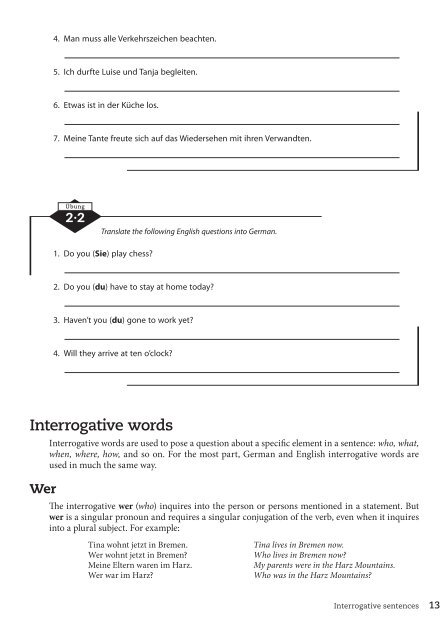german_sentence_builder
You also want an ePaper? Increase the reach of your titles
YUMPU automatically turns print PDFs into web optimized ePapers that Google loves.
4. Man muss alle Verkehrszeichen beachten.<br />
5. Ich durfte Luise und Tanja begleiten.<br />
6. Etwas ist in der Küche los.<br />
7. Meine Tante freute sich auf das Wiedersehen mit ihren Verwandten.<br />
Übung<br />
2·2<br />
Translate the following English questions into German.<br />
1. Do you (Sie) play chess?<br />
2. Do you (du) have to stay at home today?<br />
3. Haven’t you (du) gone to work yet?<br />
4. Will they arrive at ten o’clock?<br />
Interrogative words<br />
Wer<br />
Interrogative words are used to pose a question about a specific element in a <strong>sentence</strong>: who, what,<br />
when, where, how, and so on. For the most part, German and English interrogative words are<br />
used in much the same way.<br />
The interrogative wer (who) inquires into the person or persons mentioned in a statement. But<br />
wer is a singular pronoun and requires a singular conjugation of the verb, even when it inquires<br />
into a plural subject. For example:<br />
Tina wohnt jetzt in Bremen.<br />
Wer wohnt jetzt in Bremen?<br />
Meine Eltern waren im Harz.<br />
Wer war im Harz?<br />
Tina lives in Bremen now.<br />
Who lives in Bremen now?<br />
My parents were in the Harz Mountains.<br />
Who was in the Harz Mountains?<br />
Interrogative <strong>sentence</strong>s 13



